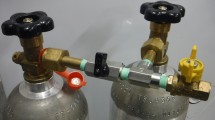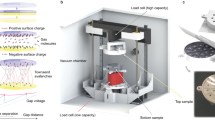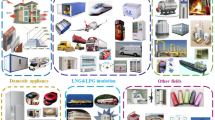Abstract
THE influence of water vapour on the breakdown voltage of uniform field gaps has been investigated by Ritz1. He found that the breakdown voltage of a 1-cm. uniform field gap at 760 mm. mercury pressure in air increased by 2 per cent for a change in the partial pressure of water vapour from 10 to 25 mm. mercury. More recently, Köhrmann2 has published results which indicate that the presence of water vapour at 10 mm. mercury raised the breakdown voltage by 2.7 per cent above that of dry air at 760 mm. mercury. Lewis3 investigated the humidity effect for sphere gaps and quoted an increase of 0.13 per cent in voltage for each mm. mercury of water vapour. This value is rather low compared with the two other results and may be due to the fact that he used a gap of 0.4 cm. between 2-cm. spheres.
This is a preview of subscription content, access via your institution
Access options
Subscribe to this journal
Receive 51 print issues and online access
$199.00 per year
only $3.90 per issue
Buy this article
- Purchase on Springer Link
- Instant access to full article PDF
Prices may be subject to local taxes which are calculated during checkout
Similar content being viewed by others
References
Ritz, H., Archiv für Elektrotechnik, 26, 219 (1932).
Köhrmann, W., Ann. d. Phys., 18, 379 (1956).
Lewis, A. B., J. App. Phys., 10, 573 (1939).
Author information
Authors and Affiliations
Rights and permissions
About this article
Cite this article
ALLEN, K., PHILLIPS, K. Effect of Humidity on the Spark Breakdown Voltage. Nature 183, 174–175 (1959). https://doi.org/10.1038/183174a0
Issue Date:
DOI: https://doi.org/10.1038/183174a0
This article is cited by
-
Charge mosaics on contact-electrified dielectrics result from polarity-inverting discharges
Nature Physics (2022)
-
Employing a MEMS plasma switch for conditioning high-voltage kinetic energy harvesters
Nature Communications (2020)
-
Nanoplasma-enabled picosecond switches for ultrafast electronics
Nature (2020)
-
Effect of Humidity on the Breakdown of a 1-cm. Homogeneous Field Spark Gap in Air
Nature (1959)
Comments
By submitting a comment you agree to abide by our Terms and Community Guidelines. If you find something abusive or that does not comply with our terms or guidelines please flag it as inappropriate.



